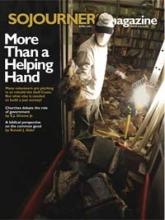From 1963 to 1966, while teaching art history at Marymount College in Tarrytown, N.Y., I was in a Catholic religious community blessed with questioning and concerned women. I was already convinced the Vietnam War was wrong—a conviction born of morality and scripture, but with little political analysis. Martin Luther King's words in spring 1967 expressed some of my consciousness: "I was a clergyman ... and ... I accepted as a commission to ... bring the ethical insights of our Judeo-Christian heritage to bear on the social evils of our day. War is one of the major evils facing humankind."
How profoundly our lives today are molded by the racism, materialism, and militarism about which Martin spoke so powerfully. How do we hold ourselves, each other, our communities, our churches, and our nation accountable? Perhaps it is the same way we carry forward King's idea that our national identity is secondary to our spiritual identity. How do we speak to an imperial nation that assumes it is entitled to dominate and control not only the earth and seas but all of outer space? We know that it has the intention and it has the means—nuclear stockpiles with world-destroying capacity.
King's insight has been realized in the United States. Our nation's "war on terror" is but the latest example: an epidemic of violence in the service of the rich and powerful. President Bush continues the war of the powerful against the powerless, with new excuses, new imperatives, new lies. The war has cost upwards of a trillion dollars. We have experienced the hostility of the Islamic world, the anger of our allies, the diminishment of our system of government, the complicity of the media, the silence of Congress, and the apathy of citizens.
Read the Full Article
